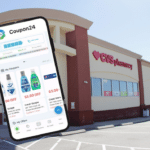
Don’t try to pull any coupon shenanigans at CVS in the new year. Not only is the drug store chain cracking down on its acceptance of “gently expired” coupons, but it’s implementing new checkout systems aimed at blocking more counterfeit coupons, all while revising how many coupons and deals it plans to offer at all.
The first phase of the changes rolled out back in September, when CVS ended what was either an informal practice or a system glitch, in accepting expired manufacturer’s coupons for up to two weeks past their printed expiration dates. This month, the same is happening with CVS store coupons, which were previously valid up to two days after expiration.
Publicly, the retailer’s coupon policy has long stated that coupons are void if expired. Earlier this year, it made its policy even more explicit in an updated FAQ on its website: “Does CVS take expired coupons? No, CVS does not accept expired coupons,” it reads bluntly.
Many couponers and employees, however, knew that some expired coupons would scan just fine if the cashier would allow it. At least until this past September, that is, when there was much online chatter in couponing groups and CVS employee message boards, about CVS changing its systems so expired manufacturer’s coupons would no longer scan at the register. CVS declined to confirm or comment on the change in response to inquires from Coupons in the News at the time.
But CVS did not dispute the authenticity of a new internal memo published by the website Coupon With Star. “In September, CVS implemented a system update aimed at enhancing the coupon validation process,” the memo confirms, saying the update was meant to achieve consistency “with CVS’s policy of not accepting expired coupons.” Since that time, though, store-issued coupons were still accepted after they supposedly expired, which “created disparate experiences for customers.” So effective in all stores by December 14th, if not sooner, “CVS is now deploying an additional update to eliminate the grace period for printed CVS coupons, aiming to create a uniform experience consistent with the company’s coupon policy.”
The memo also references “real-time validation for printed manufacturer coupons,” which is elaborated on by yet another company memo. Beginning in January, that separate memo reads, CVS “will digitize our process for the redemption of printed vendor coupons.” Those notices appear to refer, in part, to CVS’s reliance on a “master coupon file,” where scanned coupons are instantly compared against a list of all known, legitimate coupons. Once they’re determined to be legitimate, they can be validated and settled on the spot. That’s as compared with bagging them up and shipping them off to a processing facility to be sorted and counted, where it might take weeks or months before any counterfeit coupons are discovered and retailers are reimbursed for accepting the rest.
Target most notably began relying on a master coupon file last year, announcing that “manufacturer coupons must scan at the register, which validates to a master file of valid coupons.” The idea is to catch counterfeits before they can make their way through the system, since “coupons not on the master file are not accepted.” Walmart similarly updated its coupon policy recently to state that coupons will be “systematically” declined if they don’t “validate to Walmart’s master file.”
And in all cases, real-time validation of coupons is simply incompatible with expiration date grace periods. “Real time,” after all, means real time.
Either way, most manufacturers would dispute the notion that the expiration dates on their coupons are mere suggestions. Yet stores that accept expired coupons are not unheard of. Sometimes it’s for good reason – overseas military Commissary stores, for example, will accept paper manufacturer’s coupons for up to six months after their expiration dates “due to an agreement with manufacturers.” That’s for the benefit of military families who don’t have easy access to grocery coupons unless their friends and relatives back in the U.S. send them some.
Stateside, Minnesota-based Cub Foods has long been one of the most lenient retailers in accepting expired coupons. Unlike CVS, which only unofficially accepted expired coupons, Cub states outright in its policy that it “will accept expired coupons up to 30 days past the printed expiration date,” though, when asked, a customer service representative threw in the addendum that it’s “subject to manufacturer guarantee of payment.”
And that could last as long as Cub doesn’t start matching coupons to a master file and validating them in real time. If it does, the industry’s most generous expired-coupon grace period might someday come to an end there, too.
Back at CVS, the couponing changes come as it’s also preparing to cut back on promotions by switching from weekly to biweekly sales circulars in the new year. It all has some longtime CVS shoppers concerned about what might be coming next. “CVS is really getting tight. And prices keep going up,” one member of an online couponing group wrote. “Makes me wonder how much longer will coupons actually exist.” Another said it would “not surprise me at all if more stores go to not accepting paper coupons at all.”
We’re not there yet. But if CVS’s policies cause fewer people to abuse coupons or use counterfeits, it could ultimately end up working in honest couponers’ favor. “CVS’s commitment to providing a consistent and transparent coupon experience is evident in the recent system updates,” the recent company memo reads. “By aligning the treatment of various coupons and eliminating grace periods, CVS aims to streamline the customer experience while reinforcing its commitment to the existing coupon policy.”
And if it means fewer counterfeits clogging up the system, making way for more legitimate coupons for the rest of us – even better.
Image source: CVS










